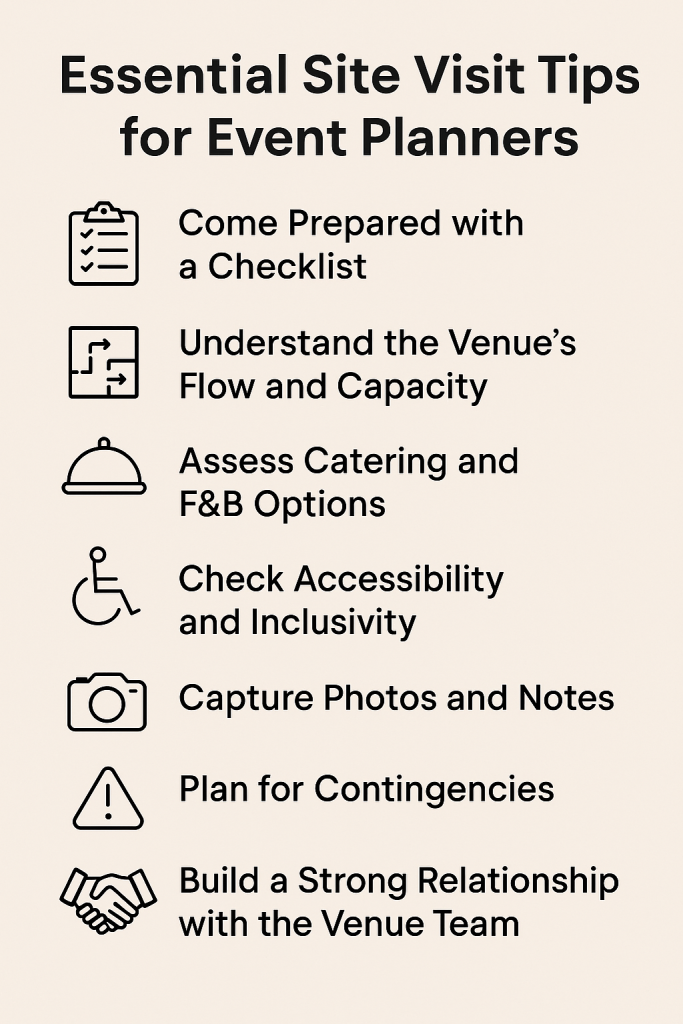A successful event starts long before the doors open—it begins with a well-executed site visit. Whether you’re planning a conference, exhibition, or a formal networking event, a thorough site visit ensures that your venue aligns with your event’s needs and expectations.
It’s your opportunity to catch potential issues, iron out the logistics, and visualise how everything will come together on event day. To help you make the most of your site visits, here are some key tips to keep in mind:
1. Come Prepared with a Checklist
Walking into a venue without a plan can easily lead to missed details. Before your visit, create a checklist covering everything from space layout and accessibility to Wi-Fi strength and catering facilities.
Think about the specifics of your event: Will there be breakout rooms? Do you need rigging points for lighting? Is there enough power for exhibitor stands? Having a structured approach ensures you leave no stone unturned.
2. Understand the Venue’s Flow and Capacity
A venue may look perfect online, but in person, it could be a whole different story. It might feel cramped or difficult to navigate. It might not physically work for the type of event you’re planning or its specific programme.
Walk through the space as if you were an attendee. Are the entry points intuitive? Will there be bottlenecks at registration or catering areas? Understanding how people will move through the space will help you optimise the layout for a smooth experience.
3. Assess Catering and F&B Options
Food and beverage offerings can significantly influence the attendee experience. Sample the menu, discuss dietary accommodations, and confirm service timings.
If you’re planning a sustainable event, which Symbiometry is passionate about supporting, ask about locally sourced options or waste reduction strategies. Also, ensure catering stations are positioned to prevent overcrowding.
4. Check Accessibility and Inclusivity
A truly successful event is accessible to all attendees. Consider wheelchair access, clear signage, quiet spaces for neurodiverse guests, and availability of hearing loops or live captioning.
Remember to ask if the venue complies with accessibility regulations and if they have experience accommodating diverse needs. When putting together your guest or delegate registration form, be sure to include a section about additional needs and requirements to find out exactly what accessibility modifications must be made.
5. Capture Photos and Notes
Your memory might fade, but photos and detailed notes will help you recall key aspects of the venue long after your site visit. It’s important to take pictures of key areas, entrances, and potential problem spots. Jot down notes about things like lighting conditions, sound quality, and the like.
It’s also helpful to take videos as you walk through the space, narrating important observations as you go. This can be especially useful when reviewing the visit later with your team or suppliers. If possible, bring a colleague along to capture additional details or offer a second perspective.
6. Plan for Contingencies
Even with meticulous event planning, unexpected issues can arise. That’s why it’s crucial to identify possible risks and have backup plans in place. During your site visit, perform a risk assessment and keep your eyes peeled for potential problem areas.
Try as we might, events don’t always go according to plan. Having a plan B (or even a plan C!) ensures you’re ready for anything. Discuss contingency options with the venue team such as:
- Backup power options
- Limited access points or technical limitations
- Weather vulnerabilities for outdoor spaces
- Emergency and evacuation protocols and alternative spaces in case of bad weather for outdoor events.
7. Build a Strong Relationship with the Venue Team
The venue’s staff will be your greatest asset on event day. Get to know the venue manager, floor staff, AV team, and catering leads. Establishing a good relationship early on will make collaboration smoother and give you access to insider knowledge that could enhance your event. The venue team is your ally who knows the space inside and out.
During your site visit, take the time to introduce yourself to key contacts at the venue. Ask questions about their experience hosting similar events and find out how they would typically handle last-minute requests or unexpected challenges.
Final Thoughts
A well-executed site visit is the foundation of a seamless event. By taking a strategic approach and covering all the key aspects, you set yourself up for success—saving time, reducing stress, and ensuring a flawless experience for attendees, exhibitors, and sponsors alike.
At Symbiometry, we specialise in managing every detail of your event, from site visits to full-scale event execution. Need help ensuring your next event runs without a hitch? Get in touch with us via email at team@symbiometry.com or through our contact us page, and let’s make it happen!

